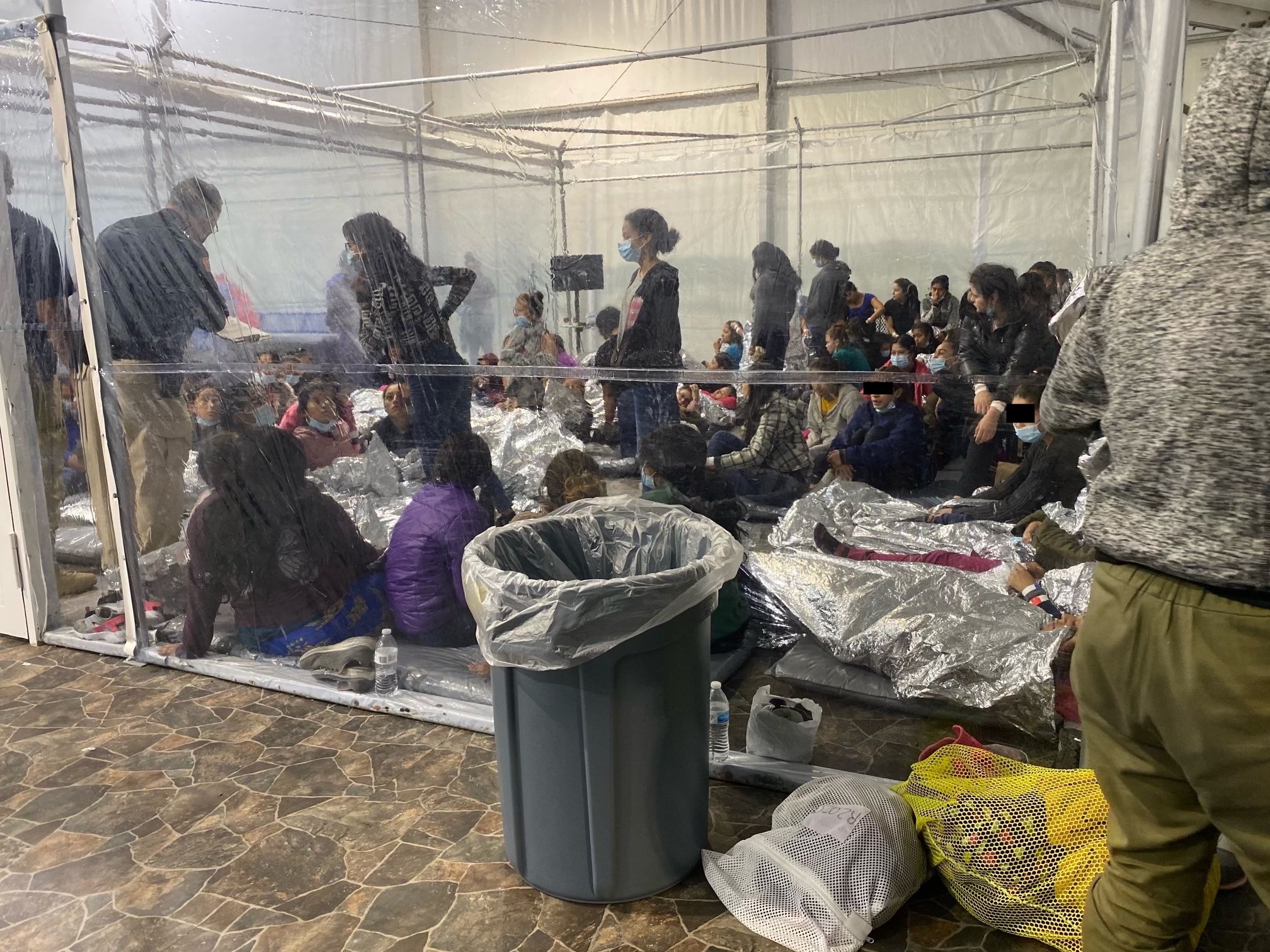Exclusive: How infighting, turmoil fueled Biden's border struggle

Aboard Air Force One en route to tour the southern border in January 2023, President Biden sat at the head of his conference table and exploded with fury.
- The president lit into his team, which included then-Deputy Chief of Staff Jen O'Malley Dillon, Homeland Security adviser Liz Sherwood-Randall and other immigration officials. He demanded obscure immigration data points — and vented when his staff didn't have them handy.
Why it matters: The previously unreported meeting, recounted to Axios by three people familiar with the events, is emblematic of the Biden administration's struggle with the border crisis during the past three years — infighting, blame-shifting and indecision.
- Biden's fury subsided, and aides scrambled for the information he wanted. People in the meeting later told others in frustration that his winding process and irritability were making it more difficult to reach decisions about the border.
- The White House counters that the meeting was "productive." Spokesperson Andrew Bates told Axios that "multiple firsthand participants of the meeting refute this description of the tone and outcome" of a conversation on "the specifics of this complex issue."
- The rolling chaos along the border has grown to the point that Biden now is embracing immigration policies he ran against in 2020 — such as restricting asylum laws and suggesting he'll "shut down" the border — as the crisis threatens his re-election.
Reality check: Much of the current crisis is rooted in factors Biden's team has had little control over — including unprecedented global calamities that have pushed millions of migrants to the U.S., decades of congressional inaction, and the state of key agencies after the Trump administration.
- Many current and former Biden officials say they believe they've done their best considering the circumstances. But others told Axios they think the administration has fallen far short on matters within its control.
Zoom in: The crisis grew slowly. Many administration leaders treated the issue like a hot potato because it was politically thankless, several sources in and out of government told Axios.
- The idea that no one wanted to "own it" came up repeatedly in interviews about the border crisis. But the problem required a robust and coordinated response at several levels of the federal government.
- As the humanitarian conditions at the border have deteriorated and the politics surrounding immigration have become a thorn for Biden, he becomes scratchier when the issue comes up, according to current and former aides.
- "There are definite incentives ... to not be the person who owns the scary issue with no solutions," a former government official close to the issue told Axios.
- "If you're the person briefing the president, you get to piss him off every day."
Some administration officials feel the State Department dragged its feet for years in setting up regional processing centers to allow more migrants to apply for protection in the U.S. before reaching the border.
- A State Department spokesperson rejected that claim, pointing to processing centers opened last year.
- Cabinet-level meetings to discuss border issues often have been attended by deputies rather than the agency leaders, two people familiar with the meetings told Axios.
- Vice President Kamala Harris and her office made clear to others in the administration that her responsibilities began and ended with the factors driving people to leave Guatemala, Honduras and El Salvador — the issue Biden had assigned her to examine.
- As the migration became more global, Harris' team remained focused on the Northern Triangle and Mexico.
- A former Biden administration senior official told Axios: "She's been at best ineffective, and at worst sporadically engaged and not seeing it was her responsibility. It's an opportunity for her, and she didn't fill the breach."
National Security Advisor Jake Sullivan, whose office hasn't historically taken on many border issues, left much of his border portfolio to Sherwood-Randall, who had little experience on the issue.
- A sign of her inexperience came early on, when she asked an official on her team for a memo explaining the difference between refugees and asylum seekers, according to a person familiar with the request.
- Sherwood-Randall keeps a low profile compared to several of her predecessors, who were regulars on Sunday shows. She's been an internal advocate for tough enforcement of migration policies, sources tell Axios.
- Sherwood-Randall is well-liked by her colleagues, but some believe she's in the wrong role.
- White House chief of staff Jeff Zients told Axios that Biden "chose Liz because she can tackle complex homeland security challenges…and he counts on her every day to manage a dizzying array of threats."
Between the lines: Warring ideologies inside the White House and the Democratic Party also slowed decision-making
- Some officials wanted policies designed to punish or deter people who crossed the border illegally. Others — including vocal immigration advocates outside the administration — pushed to reform asylum policies and expand legal pathways for migrants to stay in the U.S., sources said.
- The White House's immigration team also saw constant turnover.
- As a result, "the strategy was incoherent from the very beginning," said one former Biden White House official involved in immigration policy.
The internal turmoil led to contradictory actions by Biden's team.
- Biden stopped kicking out asylum seekers under Trump's "Remain in Mexico" program, but for years continued to use pandemic-era restrictions known as Title 42 to send asylum seekers back to Mexico.
- The administration extended temporary protections for Venezuelans in the U.S. — and weeks later, announced plans to deport Venezuelans for the first time in years.
- Biden's team stopped holding undocumented families in U.S. detention centers — a practice under Presidents Bush, Obama and Trump — in favor of monitoring people using ankle bracelets and other technology.
- Then, as conditions worsened, Biden considered restarting the detention program.
The White House generally didn't want to talk publicly about immigration or the border for much of Biden's first three years, feeling it would draw attention to a political vulnerability, sources said.
- White House officials limited and pushed against having Homeland Security Secretary Alejandro Mayorkas or other immigration officials appear on TV until a few months ago.
- Publicly, the White House also initially downplayed jumps in illegal border crossings as normal "ebbs and flows" — even as some internally pushed to acknowledge that the problem was significant.
- Some former administration officials believe the strategy provided an information vacuum — that was filled by Biden's critics.
- "[T]he White House and DHS have worked together closely," White House spokesperson Angelo Fernandez Hernandez told Axios, noting past media interviews and press conferences.
How we got here: Keeping promises he made during the 2020 campaign, Biden signed several immigration-related executive orders in his first weeks in office, undoing many of Trump's border restrictions before much of Biden's immigration team was in place or settled.
- The Department of Homeland Security (DHS) issued a 100-day moratorium on migrant deportations on Biden's first day — despite some senior officials' concerns.
- Mayorkas — now facing impeachment by the GOP-led House over the border situation — said at the time that he opposed Biden's moratorium, according to people familiar with his comments during the transition.
- A DHS spokesperson did not provide a comment.
Zoom out: Border officials and experts have long warned about the ways smugglers use and manipulate information about U.S. policies to encourage people to migrate.
- In early 2021, the new Biden administration was surprised by rapidly climbing numbers of children and teens crossing the border illegally.
- Photos of women and kids crowded inside Border Patrol tents led critics to compare Biden's border policies to the "kids in cages" attacks on Trump. "It was a panic," one former Biden official said.
- Biden became most personally engaged on border issues when children were at risk, multiple sources said.
Infighting broke out among those on Biden's team.
- Domestic Policy Advisor Susan Rice emerged as a central — and controversial — coordinator of the administration's approach to the border.
- Some officials found her needlessly combative and disagreed with her policy-wise. But even many of her critics credit her with taking on more responsibility on the border at a time when most other top Biden officials were shying away from it.
- There was — and still is — deep animosity toward Health and Human Services Secretary Xavier Becerra for what was seen as his reluctance to find more space in child migrant shelters, which are overseen by HHS, according to several sources familiar with the dynamics.
- Rice referred to Becerra as a "bitch-ass" and privately called him an "idiot," according to multiple sources.
- During one meeting when Biden was tearing into Becerra, Rice passed Mayorkas a note that read: "Don't save him," according to two people familiar with the meeting.
- "The Trump administration severely restricted [the Office of Refugee Resettlement] capacity to serve children referred to our care," HHS spokesperson Jeff Nesbit told Axios in a statement.
- "We worked quickly, but under any circumstances you can't stand up licensed child-care beds overnight, much less in the middle of a pandemic."

Rice also clashed repeatedly with Sherwood-Randall and had tension with Vice President Harris, according to people familiar with the dynamics.
- The tension between Rice and Harris had origins in the summer of 2020, when both were being vetted for vice president. Rice later told people she thought Harris and her team were partly responsible for opposition research that resulted in negative coverage of Rice.
- Rice appeared to others to take pride in being more informed on the border than Harris.
- Some Harris aides found Rice to be disrespectful toward the vice president and dismissively referred to the former UN ambassador as just a "staffer."
- Rice declined interview requests. A spokesperson said she "categorically denies" the reporting about her relationship with Becerra and Harris.
- Carmel Martin, a policy adviser to Rice and then Harris before leaving last year, disputed that there was tension: "As a former senior staff member for both Vice President Harris and Ambassador Rice, I know firsthand that they and their teams worked hand in hand to address the complex issues of migration."
- Since Rice left her position last year, the new head of the Domestic Policy Council — Neera Tanden — has been less engaged on the border.
In September 2021 near Del Rio, Texas, a makeshift camp sprung up along the U.S. banks of the Rio Grande with what would become thousands of Haitians and other migrants, overwhelming border personnel and driving national headlines.
- Two former administration officials called it the worst day in their jobs. "It was a moment where people were gonna get hurt," one said.
- Afterward, Jason Houser, then the deputy chief of staff at ICE, made several profanity-laced calls to White House and DHS officials, angry about ramping up expulsions of Haitians using Title 42, according to sources with knowledge of the calls.
- The episode led to what many sources called the administration's most important move on border policy: The Cuban, Haitian, Nicaraguan and Venezuelan parole program, which took a carrot-and-stick approach by providing legal pathways into the U.S. while blocking asylum for many who crossed the border illegally.
- At least initially, it was effective in reducing illegal crossings.
What they're saying: "President Biden is proud that his team has worked well together as they work to resolve unprecedented challenges, and as congressional Republicans continue to choose politics over securing our border," White House spokesperson Andrew Bates told Axios.
